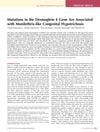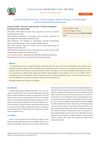Localized Autosomal Recessive Hypotrichosis Due to a Frameshift Mutation in the Desmoglein 4 Gene Exhibits Extensive Phenotypic Variability Within a Pakistani Family
TLDR A specific gene mutation causes varying hair loss severity in a Pakistani family.
The study investigated a Pakistani family with localized autosomal recessive hypotrichosis caused by a frameshift mutation in the desmoglein 4 gene. Researchers observed extensive phenotypic variability among affected family members, indicating that the same genetic mutation could result in different levels of hair loss severity. This variability suggested that other genetic or environmental factors might influence the expression of the condition. The findings highlighted the complexity of genetic hair disorders and the need for further research to understand the underlying mechanisms.





